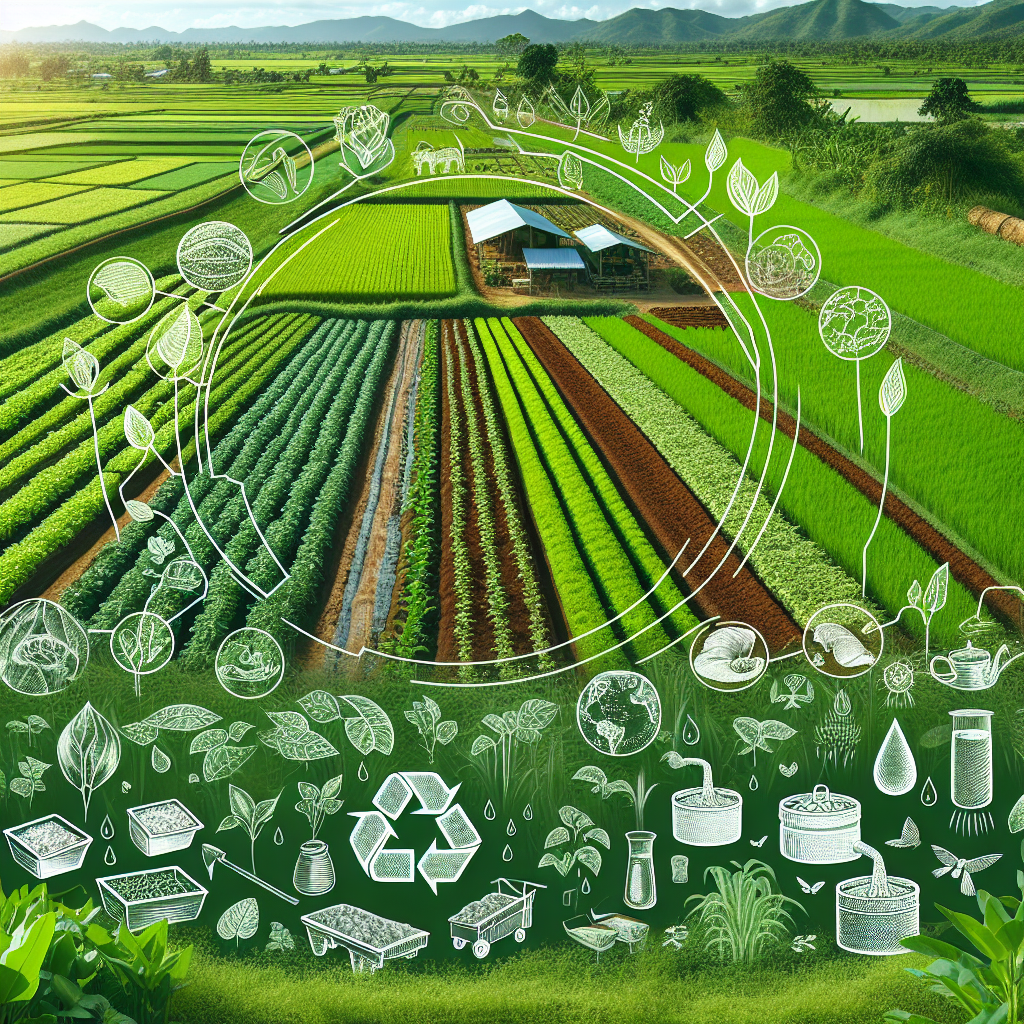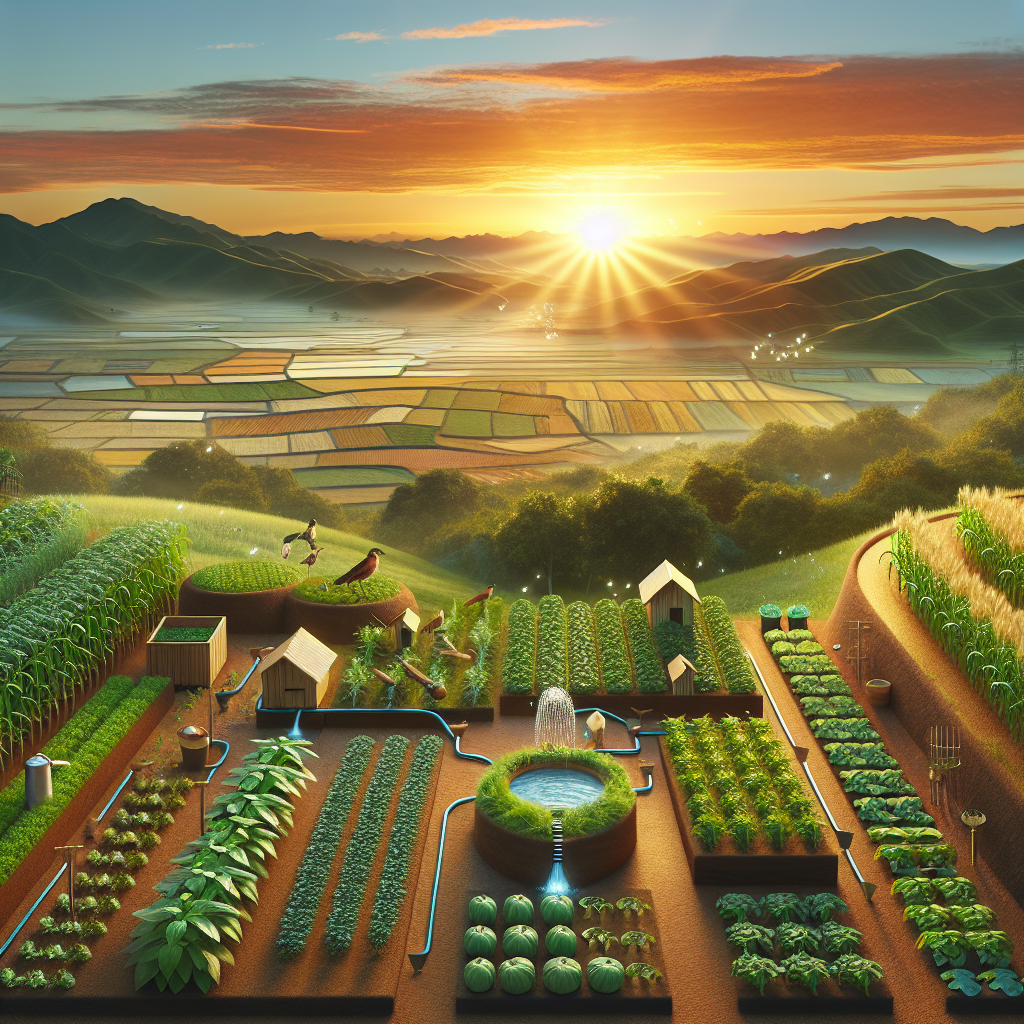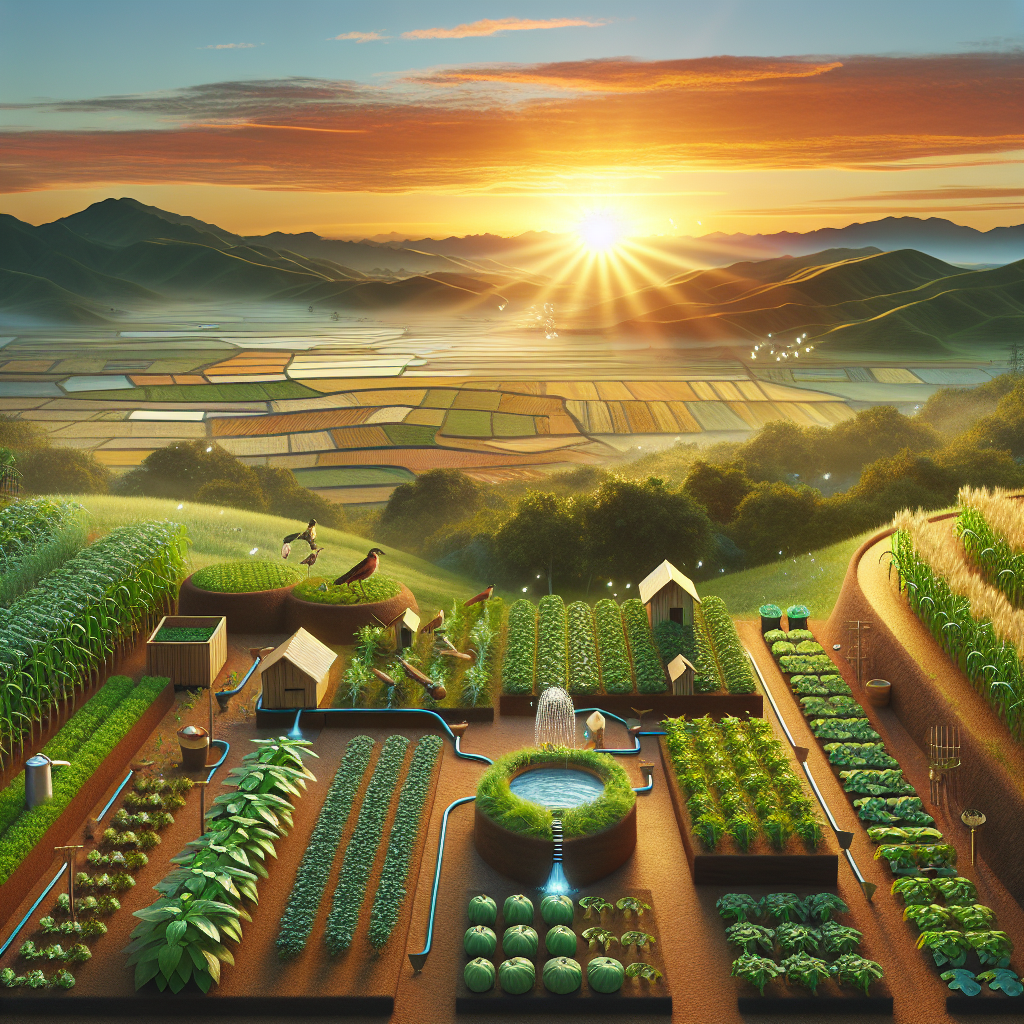You may not know it, but sustainable agriculture has a significant impact on our lives, our communities, and our planet. This article will shed light on the importance of sustainable agriculture and why it should be a priority for all of us. By embracing sustainable farming practices, we not only ensure the long-term health and productivity of our soils but also contribute to the conservation of water resources, the preservation of biodiversity, and the reduction of greenhouse gas emissions. So let’s explore why sustainable agriculture matters and how it can shape a better future for generations to come.
Environmental Benefits of Sustainable Agriculture
Reduced soil erosion
Sustainable agriculture practices focus on preserving the integrity of the soil, which leads to reduced soil erosion. By implementing techniques such as contour plowing, terracing, and agroforestry, farmers can effectively minimize the loss of topsoil caused by water and wind erosion. This helps to maintain the fertility of the soil and prevents the degradation of agricultural land.
Conservation of water resources
Water is a scarce resource, and sustainable agriculture practices aim to conserve and make efficient use of this precious commodity. Through the adoption of water-efficient irrigation systems such as drip irrigation and precision agriculture, farmers can minimize water wastage and ensure that water resources are used judiciously. Moreover, methods like agroforestry and creating buffer zones can help in conserving water by reducing evaporation and protecting water bodies from pollution.
Preservation of biodiversity
Sustainable agriculture recognizes the importance of biodiversity in maintaining ecosystem health. By implementing practices such as crop rotation, agroecology, and creating wildlife habitats, farmers can promote the preservation of biodiversity on their lands. Preserving native plant species and providing shelter for beneficial insects and pollinators not only supports ecological balance but also contributes to the overall health and resilience of agricultural systems.
Reduction in greenhouse gas emissions
Sustainable agriculture plays a crucial role in mitigating climate change by reducing greenhouse gas emissions. By minimizing the use of synthetic fertilizers and adopting organic farming practices, farmers can lower their carbon footprint. Additionally, the practice of agroforestry, which involves integrating trees on farmlands, can sequester significant amounts of carbon dioxide from the atmosphere. These sustainable practices contribute to a more sustainable and climate-friendly agriculture industry.
Economic Benefits of Sustainable Agriculture
Stable and diversified income for farmers
Sustainable agriculture practices can provide farmers with a stable and diversified income stream. By diversifying their crops and implementing sustainable farming methods, farmers can reduce their dependence on a single crop and mitigate the risks associated with market fluctuations and crop failure. This allows them to secure a more consistent and reliable income, enhancing their economic stability.
Improved soil health and fertility
Sustainable agriculture practices prioritize the enhancement of soil health and fertility, which can have significant economic benefits. By implementing techniques like crop rotation, cover cropping, and adding organic matter and compost, farmers can improve the productivity of their soil. Healthier soils result in higher crop yields and reduce the need for costly inputs, ultimately leading to improved profitability for farmers.
Reduction in production cost
Sustainable agriculture practices can help farmers reduce their production costs. By minimizing the reliance on synthetic inputs, such as chemical fertilizers and pesticides, farmers can save on expensive inputs and reduce their overall production costs. Additionally, the use of water-efficient irrigation systems and conservation tillage practices can lower energy costs associated with irrigation and machinery, further contributing to cost savings.
Decreased reliance on synthetic inputs
Sustainable agriculture promotes the use of natural and organic inputs, reducing the dependence on synthetic inputs. This not only benefits the environment but also helps farmers reduce their expenses. By utilizing organic fertilizers, utilizing biological pest control methods, and improving soil health through organic matter, farmers can minimize their reliance on costly synthetic inputs. This leads to more sustainable farming practices and improved financial outcomes.

Social Benefits of Sustainable Agriculture
Healthier food choices
Sustainable agriculture promotes the production of healthier and more nutritious food. By utilizing organic farming practices and avoiding the use of synthetic chemicals, farmers can produce food free from harmful pesticides and chemicals. This benefits consumers by providing them with safer and healthier food options, reducing the risk of exposure to harmful substances often associated with conventional agriculture.
Community development and empowerment
Sustainable agriculture contributes to community development and empowerment. By promoting local and small-scale farming, sustainable agriculture helps create local job opportunities and fosters economic development within communities. Additionally, sustainable agriculture practices often involve collaboration and knowledge-sharing among farmers, leading to the development of strong and supportive community networks.
Enhanced food security
One of the significant benefits of sustainable agriculture is improved food security. By diversifying crops and promoting sustainable practices, farmers can ensure a more resilient and reliable food supply. This reduces the vulnerability of communities to food shortages and price fluctuations. Moreover, sustainable agriculture practices prioritize the conservation of water resources and protect against drought, further enhancing food security in regions prone to water scarcity.
Preservation of cultural practices
Sustainable agriculture values and preserves cultural practices that are deeply rooted in traditional farming methods. By encouraging the use of heritage seeds, local farming techniques, and preservation of traditional knowledge, sustainable agriculture supports the preservation of cultural practices. This not only strengthens cultural identity but also contributes to the sustainability and resilience of agricultural systems.
Mitigating Climate Change through Sustainable Agriculture
Carbon sequestration in soil
Sustainable agriculture practices help mitigate climate change by sequestering carbon dioxide in the soil. Through techniques such as cover cropping and agroforestry, farmers can enhance carbon storage capacity in their soils. When plants absorb carbon dioxide from the atmosphere and store it in the soil, they help reduce the amount of this greenhouse gas contributing to climate change and also improve soil fertility and structure.
Reducing deforestation and land conversion
Sustainable agriculture plays a crucial role in reducing deforestation and land conversion, which are significant contributors to climate change. By promoting sustainable practices that minimize the expansion of agricultural land into natural ecosystems, such as forests, sustainable agriculture helps protect carbon-rich habitats and prevent the release of stored carbon into the atmosphere. This contributes to the conservation of biodiversity and the preservation of valuable carbon sinks.
Promoting agroforestry practices
Agroforestry is an essential component of sustainable agriculture that involves integrating trees on farmlands. Agroforestry practices, such as alley cropping and silvopasture, have numerous environmental benefits. Trees not only provide shade and windbreaks to protect crops but also sequester carbon dioxide from the atmosphere and conserve water. Agroforestry systems enhance biodiversity, improve soil health, and contribute to climate change mitigation, making them a valuable tool in sustainable agriculture.
Enhancing resilience to climate variability
Sustainable agriculture practices increase the resilience of agricultural systems to climate variability. By diversifying crops and implementing water-efficient irrigation systems, farmers can adapt to changing climatic conditions, including droughts and floods. Additionally, sustainable agriculture enhances soil health and fertility, enabling soils to retain moisture and nutrients better, which is especially crucial during periods of climate variability. These adaptations contribute to the overall resilience and sustainability of agricultural production.

Promoting Food Security and Nutrition
Increasing crop diversity
Sustainable agriculture promotes the cultivation of diverse crop varieties. By diversifying crops, farmers can ensure a more resilient and secure food supply. Different crop varieties have different nutritional profiles, and by growing a variety of crops, farmers can provide a more balanced and nutritious diet to consumers. Crop diversity also helps combat pest and disease pressures, reducing the risk of crop failure and food shortages.
Reducing post-harvest losses
Sustainable agriculture focuses on minimizing post-harvest losses, which can significantly contribute to food insecurity. By implementing proper storage and preservation techniques, such as drying, canning, and refrigeration, farmers can reduce spoilage and food waste. This ensures a more efficient use of resources and increases the availability of nutritious food for consumption and distribution.
Enhancing access to nutritious food
Sustainable agriculture contributes to improved access to nutritious food, especially in underserved communities. By promoting local and small-scale farming, sustainable agriculture helps ensure that fresh and nutritious food is readily available to local communities. Additionally, sustainable agriculture practices often prioritize the use of organic and pesticide-free methods, providing consumers with more nutritious and healthier food choices.
Improving food storage and preservation
Sustainable agriculture emphasizes the importance of efficient and sustainable food storage and preservation methods. By improving storage facilities, implementing appropriate temperature control measures, and utilizing sustainable packaging techniques, farmers can enhance the shelf life of perishable foods. This reduces food waste, increases food availability, and promotes better utilization of resources.
Reducing Water Pollution and Contamination
Minimizing use of synthetic chemicals
Sustainable agriculture practices aim to minimize the use of synthetic chemicals, such as pesticides and fertilizers, thereby reducing water pollution and contamination. By adopting organic farming practices and utilizing natural pest control methods, farmers can minimize the risk of chemical runoff into water bodies. This helps to maintain water quality and ensure the health of aquatic ecosystems.
Implementing water-efficient irrigation systems
Water-efficient irrigation systems are a vital component of sustainable agriculture. Practices such as drip irrigation, precision agriculture, and water recycling minimize water wastage and eliminate excessive use. By optimizing water use and reducing the need for irrigation, farmers can prevent water pollution from excessive runoff and leaching of chemicals into water bodies.
Adopting organic farming practices
Organic farming practices, which prohibit the use of synthetic chemicals, play a crucial role in reducing water pollution and contamination. By relying on natural inputs, such as compost and organic fertilizers, farmers can avoid the contamination of groundwater and surface water sources. Organic farming practices prioritize the preservation of water resources and protect the quality of water needed for various ecological functions and human consumption.
Preventing nutrient runoff and leaching
Sustainable agriculture practices prioritize the prevention of nutrient runoff and leaching, which can contribute to water pollution. By implementing practices such as cover cropping, conservation tillage, and precision nutrient management, farmers can reduce the loss of nutrients into water bodies. This not only protects water quality but also ensures that nutrients can be efficiently utilized by crops, promoting sustainable and responsible nutrient management.
Sustainable Livestock Production
Implementing rotational grazing techniques
Rotational grazing is a key practice in sustainable livestock production. By dividing grazing areas into smaller sections and rotating livestock between them, farmers can ensure that pastures have sufficient time to recover and regenerate. This promotes healthier grasslands, reduces overgrazing, and enhances soil health. Additionally, rotational grazing systems can help sequester carbon in the soil, contributing to climate change mitigation.
Improving animal welfare
Sustainable agriculture prioritizes the welfare and humane treatment of animals in livestock production systems. By implementing practices that provide animals with adequate space, proper nutrition, and access to clean water, farmers can ensure the well-being of their livestock. Offering animals a stress-free and comfortable environment not only aligns with ethical considerations but also improves the overall productivity and health of the animals.
Reducing antibiotic use
Sustainable livestock production aims to minimize the use of antibiotics in animal husbandry. By implementing preventive measures, such as improved hygiene, vaccination programs, and better animal nutrition, farmers can reduce the need for antibiotics. This helps mitigate the development of antibiotic resistance and promotes sustainable practices that safeguard both animal and human health.
Managing waste and manure properly
Sustainable livestock production requires proper management of animal waste and manure. By implementing waste management systems, such as anaerobic digesters and composting, farmers can reduce the environmental impact of livestock waste. These systems help capture and utilize methane, a potent greenhouse gas, while also producing valuable resources such as biogas and nutrient-rich compost.
Preserving Soil Health and Fertility
Crop rotation and cover cropping
Sustainable agriculture promotes the use of crop rotation and cover cropping as effective techniques to preserve soil health and fertility. By rotating different crop species in a sequence, farmers can break pest and disease cycles, improve soil structure, and enhance nutrient cycling. Cover cropping involves planting specific crops during fallow periods to provide ground cover and prevent soil erosion. This helps maintain soil moisture, suppress weeds, and improve organic matter content.
Conservation tillage practices
Conservation tillage practices, such as no-till or reduced tillage, contribute to the preservation of soil health. By minimizing soil disturbance, farmers can reduce erosion, improve water infiltration, and increase organic matter retention. Conservation tillage practices help maintain the natural structure of the soil, prevent the loss of valuable topsoil, and enhance long-term soil fertility.
Reducing soil erosion
Sustainable agriculture practices prioritize the reduction of soil erosion. By implementing erosion control measures such as contour plowing and terracing, farmers can minimize the loss of topsoil caused by water and wind erosion. Retaining soil on agricultural fields is crucial for maintaining soil fertility, reducing sedimentation in water bodies, and protecting ecosystems downstream.
Applying organic matter and compost
The application of organic matter and compost is essential for preserving soil health and fertility. By adding organic materials such as compost, manure, and cover crops, farmers can improve soil structure, increase water-holding capacity, and enhance nutrient availability. Organic matter serves as a food source for beneficial soil organisms, contributing to the overall health and vitality of the soil.
Enhancing Biodiversity and Ecosystem Services
Creating wildlife habitats
Sustainable agriculture practices recognize the importance of biodiversity and aim to create wildlife habitats on farmlands. By preserving natural habitats, planting native trees, and maintaining hedgerows and field margins, farmers can provide valuable habitats for wildlife. These habitats support beneficial insects, birds, and other wildlife, contributing to the overall balance and health of agricultural ecosystems.
Conserving pollinator populations
Pollinators, such as bees and butterflies, play a crucial role in agricultural ecosystems by facilitating the pollination of crops. Sustainable agriculture practices prioritize the conservation of pollinator populations. By providing habitat resources, reducing pesticide use, and planting diverse and pollinator-friendly plants, farmers can support the health and abundance of pollinators. This enhances crop yields and contributes to the sustainability of agricultural systems.
Adopting agroecological approaches
Agroecological approaches, which integrate ecological principles into agricultural practices, are central to sustainable agriculture. By mimicking natural ecosystems and applying biodiversity-friendly techniques, farmers can enhance ecosystem services. By adopting agroecological approaches such as intercropping, companion planting, and biological pest control, farmers can reduce the need for synthetic inputs, minimize pest pressure, and improve overall ecosystem health.
Protecting natural ecosystems
Sustainable agriculture recognizes the importance of protecting natural ecosystems adjacent to farmlands. By implementing buffer zones, protected areas, and conservation easements, farmers can preserve valuable natural habitats and prevent encroachment on sensitive ecosystems. This protects biodiversity, reduces soil erosion, and ensures the provision of essential ecosystem services that benefit both agriculture and the wider environment.
Promoting Sustainable Fishing Practices
Implementing catch limits and quotas
Sustainable fishing practices involve implementing catch limits and quotas to prevent overfishing and ensure the long-term sustainability of fish stocks. By setting scientifically informed limits on the amount of fish that can be caught, fisheries can prevent the depletion of fish populations and support their recovery. This promotes the conservation of marine ecosystems and preserves fish stocks for future generations.
Protecting marine ecosystems
Sustainable fishing practices prioritize the protection of marine ecosystems. By implementing measures such as marine protected areas, closed seasons, and gear restrictions, fisheries can safeguard important habitats and reduce the impact of fishing on vulnerable species and ecosystems. These conservation efforts contribute to the overall health and resilience of marine ecosystems.
Avoiding overfishing and destructive practices
Sustainable fishing practices aim to prevent overfishing and avoid destructive fishing practices. By utilizing techniques such as selective fishing gear, bycatch reduction devices, and habitat-friendly fishing methods, fisheries can minimize unintended catch and prevent damage to marine habitats. Reducing overfishing and implementing sustainable practices are vital for maintaining the long-term viability of fisheries and ensuring the sustainability of fish stocks.
Supporting local fishing communities
Sustainable fishing practices support the economic and social well-being of local fishing communities. By prioritizing small-scale and community-based fishing, sustainable fisheries contribute to local economies and livelihoods. This helps foster community development, empowers local fishing communities, and ensures the sustainable management of fish resources for the benefit of current and future generations.
In conclusion, sustainable agriculture offers numerous environmental, economic, and social benefits. By reducing soil erosion, conserving water resources, preserving biodiversity, and reducing greenhouse gas emissions, sustainable agriculture contributes to environmental sustainability and climate change mitigation. The economic benefits include stable and diversified income for farmers, improved soil health and fertility, reduced production costs, and decreased reliance on synthetic inputs. Social benefits include healthier food choices, community development, enhanced food security, and the preservation of cultural practices. Other advantages include mitigating climate change, promoting food security and nutrition, reducing water pollution, preserving soil health and fertility, enhancing biodiversity and ecosystem services, promoting sustainable livestock production, and supporting sustainable fishing practices. With its significant positive impact on the environment, economy, and society, sustainable agriculture is crucial for a more sustainable and resilient future.

